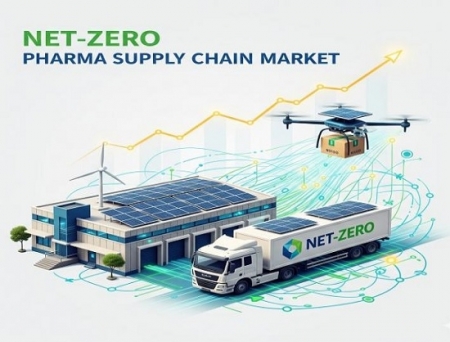Pfizer, Novartis, Roche Lead Net-Zero Pharma Supply Chain Transition

Increasing regulatory pressure to decarbonize operations is driving pharmaceutical companies to accelerate adoption of net-zero strategies across manufacturing, logistics, and distribution.
A new report by HTF Market Intelligence (HTF MI) projects the global net-zero pharma supply chain market to grow at a CAGR of 23.6 percent from 2025 to 2032, expanding from USD 2.8 billion in 2025 to USD 15.4 billion by 2032.
The market aims to achieve carbon neutrality by adopting renewable energy, electrifying transport fleets, using sustainable packaging, implementing carbon capture technologies, and optimising supply chain processes through AI and data analytics. It also addresses emissions from upstream suppliers and downstream distribution, including cold-chain transport for temperature-sensitive medicines.
According to the report, pharmaceutical leaders are increasingly aligning with government net-zero mandates, ESG investment trends, and international climate agreements. Consumer and stakeholder demand for sustainable products is further influencing procurement decisions.
Alongside the growing adoption of renewable-powered manufacturing facilities, companies are also integrating carbon capture and reuse technologies into their production lines, while expanding global partnerships with green logistics providers.
Global majors such as Pfizer, Novartis, Roche, Sanofi, GSK, AstraZeneca, Johnson & Johnson, Merck & Co., Bayer, Amgen, Takeda, Teva, Boehringer Ingelheim, Biogen, Eli Lilly, Lonza, Catalent, Thermo Fisher Scientific, Recipharm, and Wuxi AppTec are leading adoption.
Europe currently dominates the global net-zero pharma supply chain market supported by strict climate regulations, while Asia-Pacific is the fastest-growing region, spurred by new government-led sustainability policies.
However, high costs of transitioning to renewable energy and sustainable packaging are limiting adoption for smaller firms, while complex global supply chains make emission tracking and verification challenging. Adding to the challenge, regulatory inconsistencies between countries complicate standardization.
Despite these hurdles, the report highlights significant opportunities lie in renewable-powered manufacturing, green logistics partnerships, and advanced emission-tracking technologies, which can help companies meet climate commitments while maintaining supply chain efficiency.
Analysts recommend leveraging AI and blockchain for real-time carbon tracking to enhance transparency.
Partnering with renewable energy suppliers can reduce operational emissions, while expanding sustainable cold-chain logistics can improve environmental impact and brand value, the report added.
Global net-zero pharma supply chain market Green logistics providers HTF Market Intelligence Novartis Pfizer Pharmaceutical companies Renewable-powered manufacturing facilities Roche
Last news about this category

We use our own and third party cookies to produce statistical information and show you personalized advertising by analyzing your browsing, according to our COOKIES POLICY. If you continue visiting our Site, you accept its use.
More information: Privacy Policy















